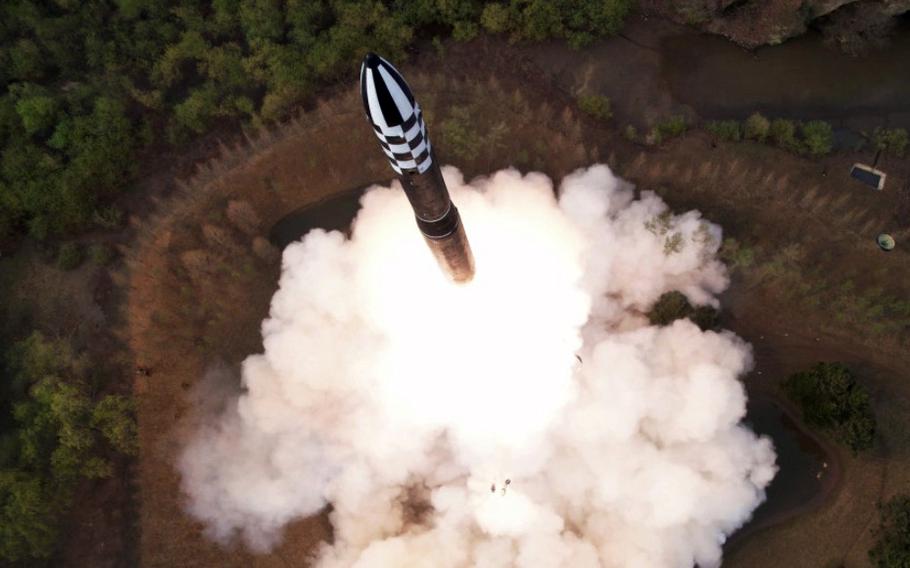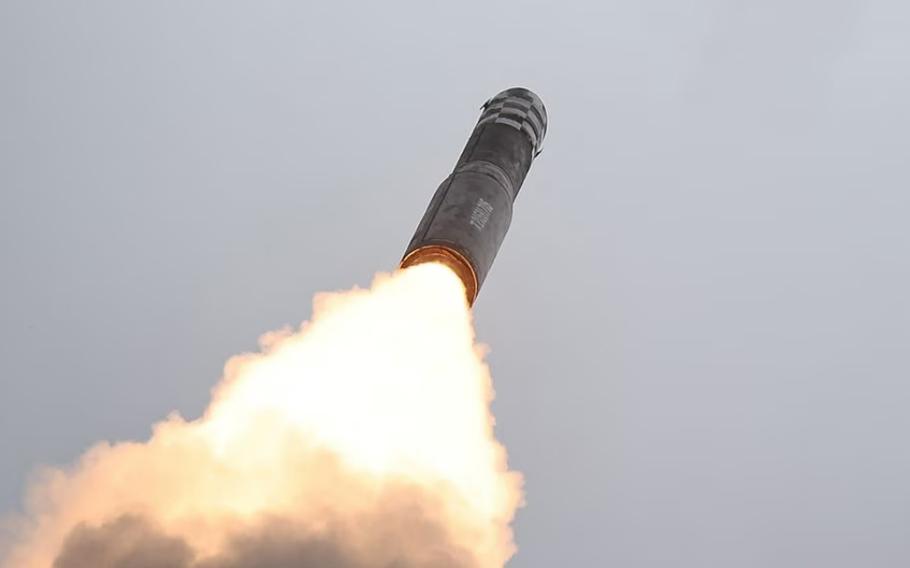
North Korea launches a solid fueled Hwasong-18 intercontinental ballistic missile, April 13, 2023, according to the state-run Korean Central News Agency. (KCNA)
CAMP HUMPHREYS, South Korea — South Korea is prepared to “overwhelmingly respond to any attack” from North Korea, including a nuclear attack, which “will bring the end of the regime,” according to a statement Wednesday from the nation’s Ministry of National Defense.
Plans recently announced by Pyongyang to strengthen its nuclear arsenal are “a serious threat that harms peace and stability” in the region, according to the ministry’s statement.
North Korea’s Supreme People’s Assembly voted unanimously Sept. 27 to amend its constitution to “exponentially” bolster the production of nuclear weapons, the state-run Korean Central News Agency reported the next day.
The rubber-stamp parliament’s vote follows North Korea’s decision in September 2022 to make its nuclear weapons program “irreversible” and ensure the country will never pursue denuclearization.
The amendment would further isolate the regime from the international community, according to the South Korean ministry’s statement.
A recent U.S. Defense Department report outlining global threats from weapons of mass destruction identified North Korea as a “persistent threat” to the United States and its allies.
In addition to its intercontinental ballistic missiles, Pyongyang’s “longstanding chemical and biological weapons capabilities remain a threat, as [it] may use such weapons during a conflict,” said the report published Sept. 28.
North Korea rejected the Pentagon’s findings and in a KCNA report published Wednesday accused the U.S. of fueling a nuclear crisis on the Korean Peninsula.

North Korea launches a Hwasong-18 intercontinental ballistic missile in this image released by the state-run Korean Central News Agency, July 13, 2023. (KCNA)
The communist regime has fired 21 ballistic missiles in 14 separate days of testing so far this year. Those launches include a solid fueled Hwasong-18 ICBM fired July 12 that flew at a lofted trajectory for roughly 74 minutes, theoretically being able to reach the continental U.S.
The perceived threat from North Korea has prompted unprecedented diplomatic moves between Washington, Seoul and Tokyo.
On Aug. 18, President Joe Biden, South Korean President Yoon Suk Yeol and Japanese Prime Minister Fumio Kishida held the first-ever standalone summit between their countries at Camp David, Md., where they ushered in a “new era of trilateral partnership” in the wake of North Korean threats, according to a joint statement.
“We are committed to pursuing enhanced ballistic missile defense cooperation to counter [North Korea’s] nuclear and missile threats,” the statement said. “We reaffirm that achieving a world without nuclear weapons is a common goal for the international community, and we continue to make every effort to ensure that nuclear weapons are never used again.”
Biden and Yoon also agreed to boost the U.S. military’s presence in South Korea through regular deployments of strategic assets. The USS Kentucky made a port call at Busan in July, marking the first such visit by a U.S. ballistic missile submarine since 1981.